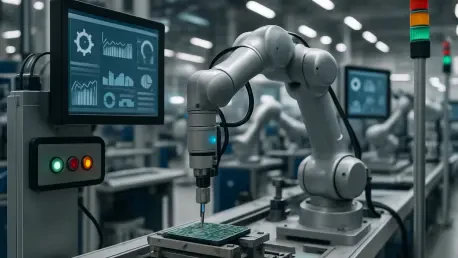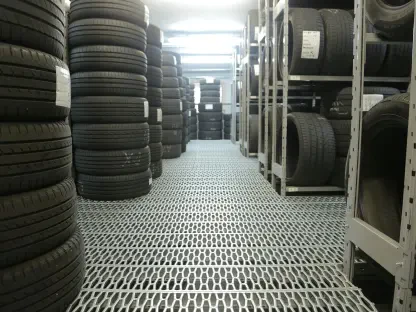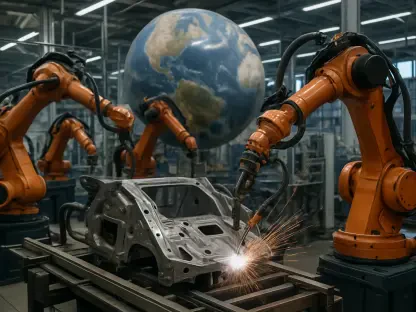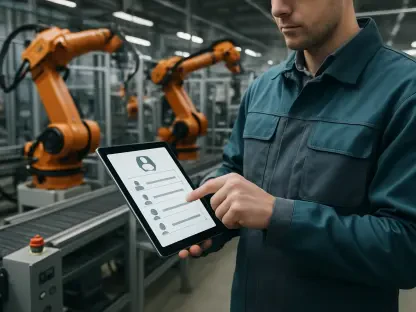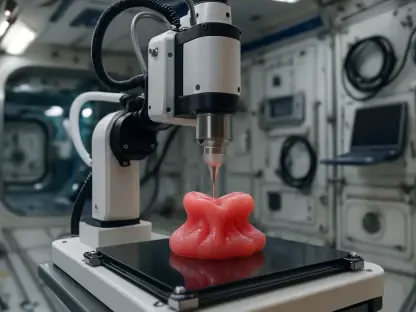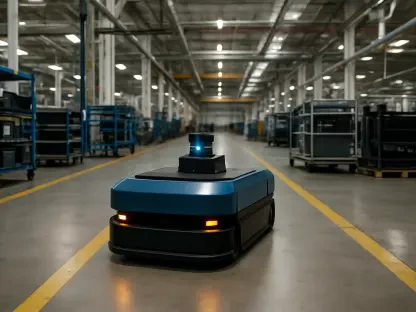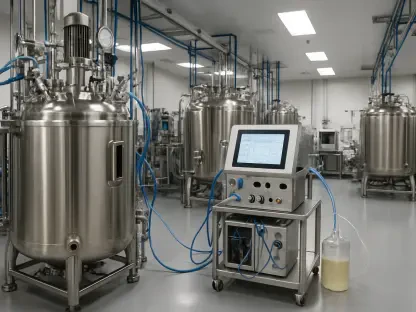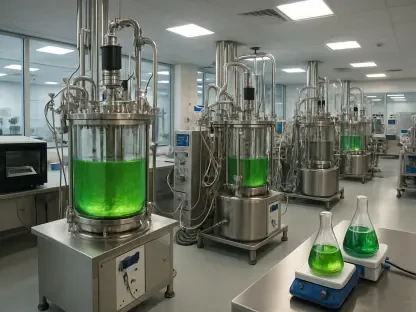The world of manufacturing has experienced a profound transformation with the advent of artificial intelligence (AI), reshaping traditional paradigms and setting new standards for efficiency and innovation. This technological revolution has powered the seamless integration of intelligent systems and solutions, enabling manufacturers to optimize processes, bolster quality control, and enhance human-machine collaboration. As AI technologies evolve, they are redefining the industrial landscape, offering significant economic benefits and driving the narrative of progress within the sector. This transformation is not without challenges; a World Economic Forum study highlights the difficulty of successful integration, yet numerous success stories demonstrate AI’s potential to redefine the future of manufacturing.
Revolutionizing Quality Assurance
Integrating AI into manufacturing has led to a significant evolution in quality assurance processes, particularly through the application of advanced image processing systems. These AI-driven systems have emerged as pivotal tools in automating product inspections, thereby ensuring consistent reliability and enhancing product quality. Inspekto stands out as a notable solution, providing a turnkey approach to visual quality checks. This innovation reduces the need for deep technical expertise in AI or image processing, making it accessible to firms with limited resources. Such systems cater to continuous quality control, offering tangible improvements in product consistency and delivery times. MTConnectivity Power2pcb exemplifies this transformation by incorporating Inspekto into its operations, enabling precision monitoring of connectors for deviations, thereby strengthening its quality assurance framework.
AI technologies have propelled advancements beyond mere automation, enhancing human-machine interactions and streamlining quality processes. The practical application of these systems manifests in their ability to conduct thorough inspections, detect anomalies, and promptly address inconsistencies. Such capabilities not only optimize manufacturing operations but advocate for a paradigm shift wherein machines coexist harmoniously with human workers. The recalibration of traditional methods underscores the transformational impact these intelligent systems have on manufacturing, setting the stage for increased efficiency, reduced operational costs, and unparalleled output quality.
Expanding Human-Machine Collaboration
The integration of generative AI into manufacturing exemplifies the enhancement of human-machine collaboration by extending the range of capabilities within industrial environments. Siemens’ Industrial Copilots mark a significant stride in advancing collaborative efforts across various stages, including design, planning, engineering, and operations. This system excels in performing repetitive and time-consuming tasks like data management and sensor configuration, allowing human engineers to prioritize high-value activities and innovation-driven pursuits. By minimizing downtime and ensuring rigorous compliance with industry standards, such as battery inspections in electric vehicles, the Copilots have significantly improved operational efficiency. Thyssenkrupp Automation Engineering’s implementation of this technology to refine systems for handling round cells illustrates the substantial impact generative AI has had on operational processes.
The transformative effect of AI in facilitating stronger collaboration between human workers and machines is evident in its ability to streamline workflows and optimize productivity. By deploying advanced data analytics and machine learning algorithms, manufacturers can harness AI capabilities to interpret complex datasets, predict outcomes, and make informed decisions. This collaborative approach not only empowers human workers to leverage AI for repetitive tasks but also fosters an agile manufacturing environment capable of rapid adaptation to changing demands. As AI continues to permeate the sector, its contribution to nurturing dynamic human-machine partnerships remains instrumental in achieving unprecedented levels of efficiency and innovation.
Predictive Maintenance Innovations
AI’s influence on manufacturing is profoundly evident in the shift from traditional maintenance practices to predictive and preemptive strategies. Siemens’ Senseye Predictive Maintenance solution embodies this transition, where AI-powered data analytics facilitate real-time monitoring of machine conditions to predict wear and tear. Conventional maintenance methods rely heavily on fixed intervals and manual inspections, often leading to inefficiencies and unexpected downtimes. In contrast, AI-enabled predictive maintenance offers a proactive approach by identifying fluctuations in key metrics such as temperature, vibration, and torque, empowering manufacturers with actionable insights and early warning alerts. By deploying technologies like Senseye, companies like Mercer Celgar consolidate data from diverse production lines, ensuring comprehensive oversight of operations, the reduction of unnecessary downtimes, and a streamlined maintenance process.
The advantages conferred by predictive maintenance extend beyond mere downtime reduction, as it significantly contributes to optimizing resource allocation and enhancing machine longevity. The ability to anticipate wear and tear allows manufacturers to allocate maintenance resources strategically, prioritize repairs, and mitigate risks effectively. Furthermore, the implementation of AI-based predictive measures fosters a culture of continuous improvement, ensuring that processes are consistently evaluated and optimized. Through such innovations, manufacturers can achieve sustained operational efficiency, bolstering their competitive edge in a dynamic industrial landscape characterized by rapid technological advancements.
Tackling Scalability Challenges
While AI solutions have gained traction in the manufacturing sector, expanding these innovations across industries is not without its challenges. The scalability of AI faces several barriers, including connectivity issues, time-consuming updates, and complex integration processes. Siemens addresses these hurdles through its Industrial AI Suite, designed to streamline AI deployment on factory floors. The suite enables the customized adaptation of solutions in collaboration with clients, ensuring an effective fusion of Siemens’ infrastructure with existing AI expertise. The strategic use of edge or cloud computing, including platforms like AWS or Microsoft Azure, facilitates seamless training of AI models in the cloud and smooth deployment in production environments through AI Inference Servers. Siemens assists a food and beverage company in integrating AI soft sensors into production lines, maintaining consistency in product quality and taste by dynamically adjusting targets based on real-time process analyses.
The ability to effectively scale AI solutions hinges on establishing customizable and adaptable infrastructures that cater to unique operational requirements. By harnessing edge computing capabilities and leveraging cloud resources, manufacturers can overcome traditional barriers and deploy AI innovations more efficiently. Furthermore, scalability ensures that AI-powered systems remain agile and responsive to changing market conditions, promoting sustained growth and competitive advantage. Through strategic partnerships and robust architectures, Siemens exemplifies the practicality of scalable AI deployments that nurture sustainable progress within the manufacturing landscape.
Harnessing AI’s Full Potential
The integration of AI into manufacturing has revolutionized quality assurance processes, chiefly through the application of sophisticated image processing technology. These AI-driven systems have become essential tools for automating product inspections, ensuring consistent reliability and product quality enhancement. One standout solution is Inspekto, offering a turnkey approach to visual quality checks and eliminating the need for deep technical expertise in AI or image processing, making it accessible to companies with limited resources. This system supports ongoing quality control, leading to tangible improvements in product consistency and delivery times. An example is MTConnectivity Power2pcb, which incorporates Inspekto to precisely monitor connectors for deviations, enhancing its quality assurance framework.
AI technologies offer more than automation, improving human-machine interaction and streamlining processes. These systems conduct thorough inspections, identify anomalies, and swiftly resolve inconsistencies, optimizing operations and promoting a transformation where machines and humans work harmoniously, increasing efficiency and reducing costs.
